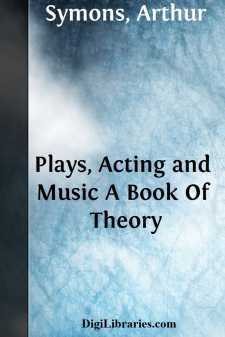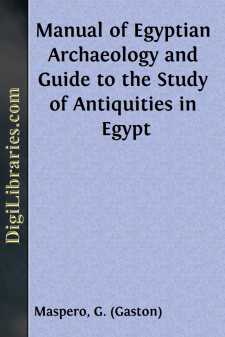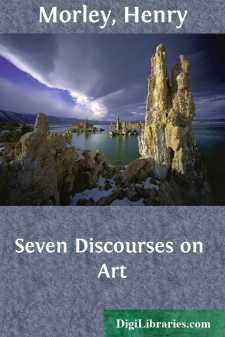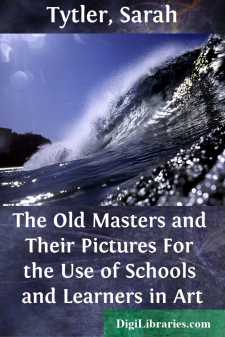Art
- African 1
- Asian 2
- Collecting 1
- Collections, Catalogs, Exhibitions 6
- Criticism 2
- European 8
- General 14
- History 11
- Middle Eastern 1
- Sculpture 4
Art Books
Sort by:
DIARY OF AN ENNUYÉE. Calais, June 21.—What young lady, travelling for the first time on the Continent, does not write a "Diary?" No sooner have we slept on the shores of France—no sooner are we seated in the gay salon at Dessin's, than we call, like Biddy Fudge, for "French pens and French ink," and forth steps from its case the morocco-bound diary, regularly ruled and paged,...
more...
by:
Arthur Symons
INTRODUCTION[2][3] After seeing a ballet, a farce, and the fragment of an opera performed by the marionettes at the Costanzi Theatre in Rome, I am inclined to ask myself why we require the intervention of any less perfect medium between the meaning of a piece, as the author conceived it, and that other meaning which it derives from our reception of it. The living actor, even when he condescends to...
more...
CHAPTER I. ARCHITECTURE--CIVIL AND MILITARY. Archaeologists, when visiting Egypt, have so concentrated their attention upon temples and tombs, that not one has devoted himself to a careful examination of the existing remains of private dwellings and military buildings. Few countries, nevertheless, have preserved so many relics of their ancient civil architecture. Setting aside towns of Roman or...
more...
by:
Lilian Whiting
THE PERIOD OF MODERN ART IN ROMEBut ah, that spring should vanish with the Rose!That youth’s sweet-scented manuscript should close?The nightingale that in the branches sang,Oh, where and whither flown again,—who knows? Omar Khayyam. Rome, as the picturesque city of the Popes in the middle years of the nineteenth century, was resplendent in local color. It was the Rome of sunny winters; the Rome of...
more...
by:
Clive Bell
SINCE CÉZANNE With anyone who concludes that this preliminary essay is merely to justify the rather appetizing title of my book I shall be at no pains to quarrel. If privately I think it does more, publicly I shall not avow it. Historically and critically, I admit, the thing is as slight as a sketch contained in five-and-thirty pages must be, and certainly it adds nothing to what I have said, in the...
more...
by:
Henry James
BLACK AND WHITE If there be nothing new under the sun there are some things a good deal less old than others. The illustration of books, and even more of magazines, may be said to have been born in our time, so far as variety and abundance are the signs of it; or born, at any rate, the comprehensive, ingenious, sympathetic spirit in which we conceive and practise it. If the centuries are ever arraigned...
more...
by:
John Galsworthy
ABOUT CENSORSHIP Since, time and again, it has been proved, in this country of free institutions, that the great majority of our fellow-countrymen consider the only Censorship that now obtains amongst us, namely the Censorship of Plays, a bulwark for the preservation of their comfort and sensibility against the spiritual researches and speculations of bolder and too active spirits—it has become time...
more...
by:
Henry Morley
INTRODUCTION It is a happy memory that associates the foundation of our Royal Academy with the delivery of these inaugural discourses by Sir Joshua Reynolds, on the opening of the schools, and at the first annual meetings for the distribution of its prizes. They laid down principles of art from the point of view of a man of genius who had made his power felt, and with the clear good sense which is...
more...
THIS exhibition has been arranged with a desire to meet the convenience of those who are interested in manifestations of the arts of different countries over which Islam held sway at one time or other in the past. An effort has been made to show under one roof representative examples of works produced at different epochs and stages of the civilizations referred to, so that they may be seen, and perhaps...
more...
by:
Sarah Tytler
EARLY ITALIAN ART—GIOTTO, 1276-1337—ANDREA PISANO. 1280-1345—ORCAGNA, 1315-1376 GHIBERTI, 1381-1455—MASACCIO, 1402-1428 OR 1429—FRA ANGELICO, 1387-1455. A pencil and paper, a box of colours, and a scrap-book, form so often a child's favourite toys that one might expect that a very large portion of men and women would prove painters. But, as we grow in years and knowledge, the discrepancy...
more...











